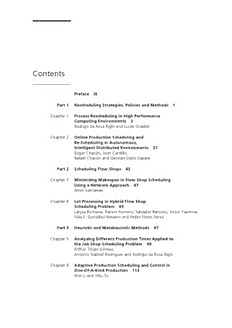
Production Scheduling PDF
Preview Production Scheduling
Contents Preface IX Part 1 Rescheduling Strategies, Policies and Methods 1 Chapter 1 Process Rescheduling in High Performance Computing Environments 3 Rodrigo da Rosa Righi and Lucas Graebin Chapter 2 Online Production Scheduling and Re-Scheduling in Autonomous, Intelligent Distributed Environments 21 Edgar Chacón, Juan Cardillo, Rafael Chacón and Germán Darío Zapata Part 2 Scheduling Flow Shops 45 Chapter 3 Minimizing Makespan in Flow Shop Scheduling Using a Network Approach 47 Amin Sahraeian Chapter 4 Lot Processing in Hybrid Flow Shop Scheduling Problem 65 Larysa Burtseva, Rainier Romero, Salvador Ramirez, Victor Yaurima, Félix F. González-Navarro and Pedro Flores Perez Part 3 Heuristic and Metaheuristic Methods 97 Chapter 5 Analyzing Different Production Times Applied to the Job Shop Scheduling Problem 99 Arthur Tórgo Gómez, Antonio Gabriel Rodrigues and Rodrigo da Rosa Righi Chapter 6 Adaptive Production Scheduling and Control in One-Of-A-Kind Production 113 Wei Li and Yiliu Tu VI Contents Part 4 Modeling and Solving Scheduling Problems in Practice 139 Chapter 7 Simulation-Based Modular Scheduling System of Semiconductor Manufacturing 141 Li Li, Qiao Fei Ma Yumin and Ye Kai Chapter 8 Production Scheduling on Practical Problems 157 Marcius Fabius Henriques de Carvalho and Rosana Beatriz Baptista Haddad Part 5 Design and Implementation of Production Scheduling Systems 183 Chapter 9 Achieving Cost Competitiveness with an Agent-Based Integrated Process Planning and Production Scheduling System 185 Ming Lim and David Zhang Chapter 10 Using Timed Coloured Petri Nets for Modelling, Simulation and Scheduling of Production Systems 207 Andrzej Bożek Preface Generally speaking, scheduling is the procedure of mapping a set of tasks or jobs (studied objects) to a set of target resources efficiently. It is an important tool in manufacturing and engineering, where it can have a major impact on the productivity of a process. More specifically, as a part of a larger planning and scheduling process, production scheduling is essential for the proper functioning of a manufacturing enterprise. Its primary goal is to maximize throughput and optimize resource utilization, while at the same time minimizing operating costs. Moreover, production scheduling is a challenging field of research in manufacturing engineering, with a high degree of exposure to the evolution of both global industries and information technology. In manufacturing, the purpose of production scheduling is to minimize production time and costs, by telling a production facility when to make something, with which staff, and using which equipment. Furthermore, advances in computer science have resulted in a wide selection of software capable of undertaking constraint-based optimization, modeling, what-if scenarios and experiment design. Current challenges in production scheduling deal with the impact of globalization, the usage of cutting- edge technologies for improved decision-making and novel modeling perspectives, including cognitive and social aspects of production scheduling. Basically, the benefits of production scheduling include: process change-over reduction; inventory reduction, leveling; reduced scheduling effort; increased production efficiency; labor load leveling; accurate delivery date quotes; real time information and so on. Considering the benefits mentioned above, the current book aims to gather information on the latest advances concerning the development of the state-of-the-art techniques for production scheduling. I am extremely proud to present to you ten book chapters divided into five sections. Section 1 shows some rescheduling strategies, policies, and methods for production scheduling. Section 2 presents two chapters about flow shop scheduling. Section 3 describes heuristic and metaheuristic methods for solving the scheduling problem in an efficient manner. In addition, two test cases are presented in Section 4. The first uses simulation, while the second shows a real implementation of a production scheduling system. Section 5 presents some modeling strategies for building production scheduling systems. X Preface We can observe that the topic of scheduling has a wide impact in several areas. Consequentially, the content of this book is not limited to engineering, but it also touches on other areas of knowledge, like biological, chemical and computational fields. This book will therefore be of interest to those working in the decision-making branches of production, in various operational research areas, as well as computational method design. People from diverse backgrounds, academia, industry and research, can take advantage of this volume. Finally, I would like to point out that I would much appreciate if you sent your comments about the book to me at [email protected]. Prof. Dr. Rodrigo da Rosa Righi Professor and researcher in the Applied Computing Graduate Program (PIPCA) Universidade do Vale do Rio dos Sinos (UNISINOS) São Leopoldo - Brazil Part 1 Rescheduling Strategies, Policies and Methods
